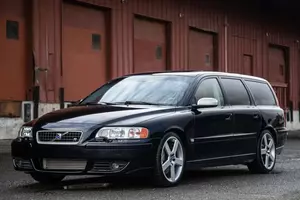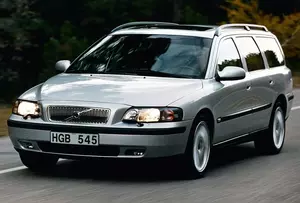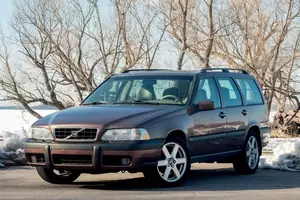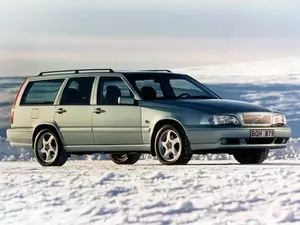
| Vehicle | Precise engine size | Difference from world average | Engine size to consumption ratio | Horsepower from 1 L | Engine size to 100 kg of weight |
|---|---|---|---|---|---|
| 1.6 T4 |
1.6 L (1596 cc) |
32% smaller | 48 cc to 1 mpg | 113 hp from 1 L | - |
| 1.6 D2 |
1.56 L (1560 cc) |
33.5% smaller | 30 cc to 1 mpg | 74 hp from 1 L | - |
| 2.0 T5 |
1.97 L (1969 cc) |
16.1% smaller | 53 cc to 1 mpg | 124 hp from 1 L | - |
| 2.0 D3 |
1.98 L (1984 cc) |
15.4% smaller | 43 cc to 1 mpg | 69 hp from 1 L | - |
| 3.0 T6 |
2.95 L (2953 cc) |
25.9% bigger | 128 cc to 1 mpg | 103 hp from 1 L | - |
| 2.0 D4 |
1.97 L (1969 cc) |
16.1% smaller | 38 cc to 1 mpg | 92 hp from 1 L | - |
| 2.4 D4 |
2.4 L (2400 cc) |
2.3% bigger | 63 cc to 1 mpg | 68 hp from 1 L | - |
| 2.4 D5 |
2.4 L (2400 cc) |
2.3% bigger | 63 cc to 1 mpg | 90 hp from 1 L | - |
| 1.6 T4F |
1.6 L (1596 cc) |
32% smaller | 48 cc to 1 mpg | 113 hp from 1 L | - |
| Vehicle | 1.6 T4 |
|---|---|
| Precise engine size | 1.6 L (1596 cc) |
| Difference from world average | 32 smaller |
| Engine size to consumption ratio | 48 cc to 1 mpg |
| Horsepower from 1 L | 113 hp from 1 L |
| Engine size to 100 kg of weight | - |
| Vehicle | 1.6 D2 |
| Precise engine size | 1.56 L (1560 cc) |
| Difference from world average | 33.5 smaller |
| Engine size to consumption ratio | 30 cc to 1 mpg |
| Horsepower from 1 L | 74 hp from 1 L |
| Engine size to 100 kg of weight | - |
| Vehicle | 2.0 T5 |
| Precise engine size | 1.97 L (1969 cc) |
| Difference from world average | 16.1 smaller |
| Engine size to consumption ratio | 53 cc to 1 mpg |
| Horsepower from 1 L | 124 hp from 1 L |
| Engine size to 100 kg of weight | - |
| Vehicle | 2.0 D3 |
| Precise engine size | 1.98 L (1984 cc) |
| Difference from world average | 15.4 smaller |
| Engine size to consumption ratio | 43 cc to 1 mpg |
| Horsepower from 1 L | 69 hp from 1 L |
| Engine size to 100 kg of weight | - |
| Vehicle | 3.0 T6 |
| Precise engine size | 2.95 L (2953 cc) |
| Difference from world average | 25.9 bigger |
| Engine size to consumption ratio | 128 cc to 1 mpg |
| Horsepower from 1 L | 103 hp from 1 L |
| Engine size to 100 kg of weight | - |
| Vehicle | 2.0 D4 |
| Precise engine size | 1.97 L (1969 cc) |
| Difference from world average | 16.1 smaller |
| Engine size to consumption ratio | 38 cc to 1 mpg |
| Horsepower from 1 L | 92 hp from 1 L |
| Engine size to 100 kg of weight | - |
| Vehicle | 2.4 D4 |
| Precise engine size | 2.4 L (2400 cc) |
| Difference from world average | 2.3 bigger |
| Engine size to consumption ratio | 63 cc to 1 mpg |
| Horsepower from 1 L | 68 hp from 1 L |
| Engine size to 100 kg of weight | - |
| Vehicle | 2.4 D5 |
| Precise engine size | 2.4 L (2400 cc) |
| Difference from world average | 2.3 bigger |
| Engine size to consumption ratio | 63 cc to 1 mpg |
| Horsepower from 1 L | 90 hp from 1 L |
| Engine size to 100 kg of weight | - |
| Vehicle | 1.6 T4F |
| Precise engine size | 1.6 L (1596 cc) |
| Difference from world average | 32 smaller |
| Engine size to consumption ratio | 48 cc to 1 mpg |
| Horsepower from 1 L | 113 hp from 1 L |
| Engine size to 100 kg of weight | - |

| Vehicle | Precise engine size | Difference from world average | Engine size to consumption ratio | Horsepower from 1 L | Engine size to 100 kg of weight |
|---|---|---|---|---|---|
| 2.0 T |
2 L (1999 cc) |
14.8% smaller | 69 cc to 1 mpg | 102 hp from 1 L | 125 cc to 100 kg |
| 2.4d |
2.4 L (2401 cc) |
2.3% bigger | 73 cc to 1 mpg | 77 hp from 1 L | - |
| 2.0F |
2 L (1999 cc) |
14.8% smaller | 74 cc to 1 mpg | 73 hp from 1 L | 125 cc to 100 kg |
| 1.6 T4 |
1.6 L (1595 cc) |
32% smaller | 51 cc to 1 mpg | 113 hp from 1 L | 89 cc to 100 kg |
| 2.4 D5 |
2.4 L (2400 cc) |
2.3% bigger | 65 cc to 1 mpg | 85 hp from 1 L | 150 cc to 100 kg |
| 2.0 |
2 L (1999 cc) |
14.8% smaller | 74 cc to 1 mpg | 73 hp from 1 L | 125 cc to 100 kg |
| 3.2 |
3.19 L (3192 cc) |
36.1% bigger | 123 cc to 1 mpg | 76 hp from 1 L | 200 cc to 100 kg |
| 2.4 D |
2.4 L (2400 cc) |
2.3% bigger | 62 cc to 1 mpg | 73 hp from 1 L | 150 cc to 100 kg |
| 2.5FT |
2.52 L (2521 cc) |
7.5% bigger | 93 cc to 1 mpg | 92 hp from 1 L | 158 cc to 100 kg |
| 1.6 T4F |
1.6 L (1596 cc) |
32% smaller | 51 cc to 1 mpg | 113 hp from 1 L | 89 cc to 100 kg |
| 1.6 DRIVe |
1.56 L (1560 cc) |
33.5% smaller | 30 cc to 1 mpg | 70 hp from 1 L | 98 cc to 100 kg |
| 2.4D |
2.4 L (2400 cc) |
2.3% bigger | 77 cc to 1 mpg | 68 hp from 1 L | 133 cc to 100 kg |
| 2.5 T |
2.52 L (2521 cc) |
7.5% bigger | 110 cc to 1 mpg | 79 hp from 1 L | - |
| 2.0 T5 |
2 L (1999 cc) |
14.8% smaller | 69 cc to 1 mpg | 120 hp from 1 L | 125 cc to 100 kg |
| 2.0 D3 |
1.98 L (1984 cc) |
15.4% smaller | 46 cc to 1 mpg | 82 hp from 1 L | 124 cc to 100 kg |
| 2.0D |
2 L (1997 cc) |
14.9% smaller | 50 cc to 1 mpg | 68 hp from 1 L | 125 cc to 100 kg |
| 3.0 T6 |
2.95 L (2953 cc) |
25.9% bigger | 128 cc to 1 mpg | 103 hp from 1 L | 164 cc to 100 kg |
| 3.0i T6 |
2.95 L (2953 cc) |
25.9% bigger | 141 cc to 1 mpg | 97 hp from 1 L | - |
| 3.2i |
3.19 L (3192 cc) |
36.1% bigger | 145 cc to 1 mpg | 75 hp from 1 L | - |
| Vehicle | 2.0 T |
|---|---|
| Precise engine size | 2 L (1999 cc) |
| Difference from world average | 14.8 smaller |
| Engine size to consumption ratio | 69 cc to 1 mpg |
| Horsepower from 1 L | 102 hp from 1 L |
| Engine size to 100 kg of weight | 125 cc to 100 kg |
| Vehicle | 2.4d |
| Precise engine size | 2.4 L (2401 cc) |
| Difference from world average | 2.3 bigger |
| Engine size to consumption ratio | 73 cc to 1 mpg |
| Horsepower from 1 L | 77 hp from 1 L |
| Engine size to 100 kg of weight | - |
| Vehicle | 2.0F |
| Precise engine size | 2 L (1999 cc) |
| Difference from world average | 14.8 smaller |
| Engine size to consumption ratio | 74 cc to 1 mpg |
| Horsepower from 1 L | 73 hp from 1 L |
| Engine size to 100 kg of weight | 125 cc to 100 kg |
| Vehicle | 1.6 T4 |
| Precise engine size | 1.6 L (1595 cc) |
| Difference from world average | 32 smaller |
| Engine size to consumption ratio | 51 cc to 1 mpg |
| Horsepower from 1 L | 113 hp from 1 L |
| Engine size to 100 kg of weight | 89 cc to 100 kg |
| Vehicle | 2.4 D5 |
| Precise engine size | 2.4 L (2400 cc) |
| Difference from world average | 2.3 bigger |
| Engine size to consumption ratio | 65 cc to 1 mpg |
| Horsepower from 1 L | 85 hp from 1 L |
| Engine size to 100 kg of weight | 150 cc to 100 kg |
| Vehicle | 2.0 |
| Precise engine size | 2 L (1999 cc) |
| Difference from world average | 14.8 smaller |
| Engine size to consumption ratio | 74 cc to 1 mpg |
| Horsepower from 1 L | 73 hp from 1 L |
| Engine size to 100 kg of weight | 125 cc to 100 kg |
| Vehicle | 3.2 |
| Precise engine size | 3.19 L (3192 cc) |
| Difference from world average | 36.1 bigger |
| Engine size to consumption ratio | 123 cc to 1 mpg |
| Horsepower from 1 L | 76 hp from 1 L |
| Engine size to 100 kg of weight | 200 cc to 100 kg |
| Vehicle | 2.4 D |
| Precise engine size | 2.4 L (2400 cc) |
| Difference from world average | 2.3 bigger |
| Engine size to consumption ratio | 62 cc to 1 mpg |
| Horsepower from 1 L | 73 hp from 1 L |
| Engine size to 100 kg of weight | 150 cc to 100 kg |
| Vehicle | 2.5FT |
| Precise engine size | 2.52 L (2521 cc) |
| Difference from world average | 7.5 bigger |
| Engine size to consumption ratio | 93 cc to 1 mpg |
| Horsepower from 1 L | 92 hp from 1 L |
| Engine size to 100 kg of weight | 158 cc to 100 kg |
| Vehicle | 1.6 T4F |
| Precise engine size | 1.6 L (1596 cc) |
| Difference from world average | 32 smaller |
| Engine size to consumption ratio | 51 cc to 1 mpg |
| Horsepower from 1 L | 113 hp from 1 L |
| Engine size to 100 kg of weight | 89 cc to 100 kg |
| Vehicle | 1.6 DRIVe |
| Precise engine size | 1.56 L (1560 cc) |
| Difference from world average | 33.5 smaller |
| Engine size to consumption ratio | 30 cc to 1 mpg |
| Horsepower from 1 L | 70 hp from 1 L |
| Engine size to 100 kg of weight | 98 cc to 100 kg |
| Vehicle | 2.4D |
| Precise engine size | 2.4 L (2400 cc) |
| Difference from world average | 2.3 bigger |
| Engine size to consumption ratio | 77 cc to 1 mpg |
| Horsepower from 1 L | 68 hp from 1 L |
| Engine size to 100 kg of weight | 133 cc to 100 kg |
| Vehicle | 2.5 T |
| Precise engine size | 2.52 L (2521 cc) |
| Difference from world average | 7.5 bigger |
| Engine size to consumption ratio | 110 cc to 1 mpg |
| Horsepower from 1 L | 79 hp from 1 L |
| Engine size to 100 kg of weight | - |
| Vehicle | 2.0 T5 |
| Precise engine size | 2 L (1999 cc) |
| Difference from world average | 14.8 smaller |
| Engine size to consumption ratio | 69 cc to 1 mpg |
| Horsepower from 1 L | 120 hp from 1 L |
| Engine size to 100 kg of weight | 125 cc to 100 kg |
| Vehicle | 2.0 D3 |
| Precise engine size | 1.98 L (1984 cc) |
| Difference from world average | 15.4 smaller |
| Engine size to consumption ratio | 46 cc to 1 mpg |
| Horsepower from 1 L | 82 hp from 1 L |
| Engine size to 100 kg of weight | 124 cc to 100 kg |
| Vehicle | 2.0D |
| Precise engine size | 2 L (1997 cc) |
| Difference from world average | 14.9 smaller |
| Engine size to consumption ratio | 50 cc to 1 mpg |
| Horsepower from 1 L | 68 hp from 1 L |
| Engine size to 100 kg of weight | 125 cc to 100 kg |
| Vehicle | 3.0 T6 |
| Precise engine size | 2.95 L (2953 cc) |
| Difference from world average | 25.9 bigger |
| Engine size to consumption ratio | 128 cc to 1 mpg |
| Horsepower from 1 L | 103 hp from 1 L |
| Engine size to 100 kg of weight | 164 cc to 100 kg |
| Vehicle | 3.0i T6 |
| Precise engine size | 2.95 L (2953 cc) |
| Difference from world average | 25.9 bigger |
| Engine size to consumption ratio | 141 cc to 1 mpg |
| Horsepower from 1 L | 97 hp from 1 L |
| Engine size to 100 kg of weight | - |
| Vehicle | 3.2i |
| Precise engine size | 3.19 L (3192 cc) |
| Difference from world average | 36.1 bigger |
| Engine size to consumption ratio | 145 cc to 1 mpg |
| Horsepower from 1 L | 75 hp from 1 L |
| Engine size to 100 kg of weight | - |

| Vehicle | Precise engine size | Difference from world average | Engine size to consumption ratio | Horsepower from 1 L | Engine size to 100 kg of weight |
|---|---|---|---|---|---|
| 2.4i 20V T5 |
2.4 L (2401 cc) |
2.3% bigger | - | 108 hp from 1 L | 150 cc to 100 kg |
| 2.4 D5 |
2.4 L (2401 cc) |
2.3% bigger | - | 77 hp from 1 L | 141 cc to 100 kg |
| Vehicle | 2.4i 20V T5 |
|---|---|
| Precise engine size | 2.4 L (2401 cc) |
| Difference from world average | 2.3 bigger |
| Engine size to consumption ratio | - |
| Horsepower from 1 L | 108 hp from 1 L |
| Engine size to 100 kg of weight | 150 cc to 100 kg |
| Vehicle | 2.4 D5 |
| Precise engine size | 2.4 L (2401 cc) |
| Difference from world average | 2.3 bigger |
| Engine size to consumption ratio | - |
| Horsepower from 1 L | 77 hp from 1 L |
| Engine size to 100 kg of weight | 141 cc to 100 kg |

| Vehicle | Precise engine size | Difference from world average | Engine size to consumption ratio | Horsepower from 1 L | Engine size to 100 kg of weight |
|---|---|---|---|---|---|
| 2.4 T |
2.44 L (2435 cc) |
3.8% bigger | 97 cc to 1 mpg | 82 hp from 1 L | 152 cc to 100 kg |
| 2.4 |
2.44 L (2435 cc) |
3.8% bigger | 94 cc to 1 mpg | 57 hp from 1 L | 162 cc to 100 kg |
| 2.5i V20 |
2.52 L (2521 cc) |
7.5% bigger | - | 119 hp from 1 L | 148 cc to 100 kg |
| 2.0 T |
1.98 L (1984 cc) |
15.4% smaller | 83 cc to 1 mpg | 91 hp from 1 L | 132 cc to 100 kg |
| 2.5i 20V |
2.52 L (2521 cc) |
7.5% bigger | - | 83 hp from 1 L | 158 cc to 100 kg |
| T5 |
2.32 L (2319 cc) |
1.2% smaller | 93 cc to 1 mpg | 108 hp from 1 L | 145 cc to 100 kg |
| 2.4 D |
2.4 L (2401 cc) |
2.3% bigger | 69 cc to 1 mpg | 68 hp from 1 L | 150 cc to 100 kg |
| 2.4 Bi-Fuel |
2.44 L (2435 cc) |
3.8% bigger | - | 57 hp from 1 L | 152 cc to 100 kg |
| 2.5 TDI |
2.46 L (2461 cc) |
4.9% bigger | - | 57 hp from 1 L | 154 cc to 100 kg |
| Vehicle | 2.4 T |
|---|---|
| Precise engine size | 2.44 L (2435 cc) |
| Difference from world average | 3.8 bigger |
| Engine size to consumption ratio | 97 cc to 1 mpg |
| Horsepower from 1 L | 82 hp from 1 L |
| Engine size to 100 kg of weight | 152 cc to 100 kg |
| Vehicle | 2.4 |
| Precise engine size | 2.44 L (2435 cc) |
| Difference from world average | 3.8 bigger |
| Engine size to consumption ratio | 94 cc to 1 mpg |
| Horsepower from 1 L | 57 hp from 1 L |
| Engine size to 100 kg of weight | 162 cc to 100 kg |
| Vehicle | 2.5i V20 |
| Precise engine size | 2.52 L (2521 cc) |
| Difference from world average | 7.5 bigger |
| Engine size to consumption ratio | - |
| Horsepower from 1 L | 119 hp from 1 L |
| Engine size to 100 kg of weight | 148 cc to 100 kg |
| Vehicle | 2.0 T |
| Precise engine size | 1.98 L (1984 cc) |
| Difference from world average | 15.4 smaller |
| Engine size to consumption ratio | 83 cc to 1 mpg |
| Horsepower from 1 L | 91 hp from 1 L |
| Engine size to 100 kg of weight | 132 cc to 100 kg |
| Vehicle | 2.5i 20V |
| Precise engine size | 2.52 L (2521 cc) |
| Difference from world average | 7.5 bigger |
| Engine size to consumption ratio | - |
| Horsepower from 1 L | 83 hp from 1 L |
| Engine size to 100 kg of weight | 158 cc to 100 kg |
| Vehicle | T5 |
| Precise engine size | 2.32 L (2319 cc) |
| Difference from world average | 1.2 smaller |
| Engine size to consumption ratio | 93 cc to 1 mpg |
| Horsepower from 1 L | 108 hp from 1 L |
| Engine size to 100 kg of weight | 145 cc to 100 kg |
| Vehicle | 2.4 D |
| Precise engine size | 2.4 L (2401 cc) |
| Difference from world average | 2.3 bigger |
| Engine size to consumption ratio | 69 cc to 1 mpg |
| Horsepower from 1 L | 68 hp from 1 L |
| Engine size to 100 kg of weight | 150 cc to 100 kg |
| Vehicle | 2.4 Bi-Fuel |
| Precise engine size | 2.44 L (2435 cc) |
| Difference from world average | 3.8 bigger |
| Engine size to consumption ratio | - |
| Horsepower from 1 L | 57 hp from 1 L |
| Engine size to 100 kg of weight | 152 cc to 100 kg |
| Vehicle | 2.5 TDI |
| Precise engine size | 2.46 L (2461 cc) |
| Difference from world average | 4.9 bigger |
| Engine size to consumption ratio | - |
| Horsepower from 1 L | 57 hp from 1 L |
| Engine size to 100 kg of weight | 154 cc to 100 kg |

| Vehicle | Precise engine size | Difference from world average | Engine size to consumption ratio | Horsepower from 1 L | Engine size to 100 kg of weight |
|---|---|---|---|---|---|
| 2.4 T |
2.44 L (2435 cc) |
3.8% bigger | 111 cc to 1 mpg | 82 hp from 1 L | 152 cc to 100 kg |
| Vehicle | 2.4 T |
|---|---|
| Precise engine size | 2.44 L (2435 cc) |
| Difference from world average | 3.8 bigger |
| Engine size to consumption ratio | 111 cc to 1 mpg |
| Horsepower from 1 L | 82 hp from 1 L |
| Engine size to 100 kg of weight | 152 cc to 100 kg |

| Vehicle | Precise engine size | Difference from world average | Engine size to consumption ratio | Horsepower from 1 L | Engine size to 100 kg of weight |
|---|---|---|---|---|---|
| 2.5 TDI |
2.46 L (2461 cc) |
4.9% bigger | 68 cc to 1 mpg | 57 hp from 1 L | 164 cc to 100 kg |
| 2.3 Turbo |
2.32 L (2319 cc) |
1.2% smaller | 93 cc to 1 mpg | 108 hp from 1 L | 136 cc to 100 kg |
| 2.4i 20V |
2.44 L (2435 cc) |
3.8% bigger | - | 70 hp from 1 L | 162 cc to 100 kg |
| 2.3 20V T-5 |
2.32 L (2319 cc) |
1.2% smaller | - | 103 hp from 1 L | 145 cc to 100 kg |
| 2.5 |
2.44 L (2435 cc) |
3.8% bigger | - | 59 hp from 1 L | 162 cc to 100 kg |
| 2.0 |
1.98 L (1984 cc) |
15.4% smaller | - | 64 hp from 1 L | 132 cc to 100 kg |
| 2.0 20V Turbo |
1.98 L (1984 cc) |
15.4% smaller | - | 114 hp from 1 L | 132 cc to 100 kg |
| 2.5 20V Turbo |
2.44 L (2435 cc) |
3.8% bigger | - | 79 hp from 1 L | 162 cc to 100 kg |
| 2.0 20V |
1.98 L (1984 cc) |
15.4% smaller | - | 91 hp from 1 L | 132 cc to 100 kg |
| 2.3 T |
2.32 L (2319 cc) |
1.2% smaller | - | 108 hp from 1 L | 136 cc to 100 kg |
| Vehicle | 2.5 TDI |
|---|---|
| Precise engine size | 2.46 L (2461 cc) |
| Difference from world average | 4.9 bigger |
| Engine size to consumption ratio | 68 cc to 1 mpg |
| Horsepower from 1 L | 57 hp from 1 L |
| Engine size to 100 kg of weight | 164 cc to 100 kg |
| Vehicle | 2.3 Turbo |
| Precise engine size | 2.32 L (2319 cc) |
| Difference from world average | 1.2 smaller |
| Engine size to consumption ratio | 93 cc to 1 mpg |
| Horsepower from 1 L | 108 hp from 1 L |
| Engine size to 100 kg of weight | 136 cc to 100 kg |
| Vehicle | 2.4i 20V |
| Precise engine size | 2.44 L (2435 cc) |
| Difference from world average | 3.8 bigger |
| Engine size to consumption ratio | - |
| Horsepower from 1 L | 70 hp from 1 L |
| Engine size to 100 kg of weight | 162 cc to 100 kg |
| Vehicle | 2.3 20V T-5 |
| Precise engine size | 2.32 L (2319 cc) |
| Difference from world average | 1.2 smaller |
| Engine size to consumption ratio | - |
| Horsepower from 1 L | 103 hp from 1 L |
| Engine size to 100 kg of weight | 145 cc to 100 kg |
| Vehicle | 2.5 |
| Precise engine size | 2.44 L (2435 cc) |
| Difference from world average | 3.8 bigger |
| Engine size to consumption ratio | - |
| Horsepower from 1 L | 59 hp from 1 L |
| Engine size to 100 kg of weight | 162 cc to 100 kg |
| Vehicle | 2.0 |
| Precise engine size | 1.98 L (1984 cc) |
| Difference from world average | 15.4 smaller |
| Engine size to consumption ratio | - |
| Horsepower from 1 L | 64 hp from 1 L |
| Engine size to 100 kg of weight | 132 cc to 100 kg |
| Vehicle | 2.0 20V Turbo |
| Precise engine size | 1.98 L (1984 cc) |
| Difference from world average | 15.4 smaller |
| Engine size to consumption ratio | - |
| Horsepower from 1 L | 114 hp from 1 L |
| Engine size to 100 kg of weight | 132 cc to 100 kg |
| Vehicle | 2.5 20V Turbo |
| Precise engine size | 2.44 L (2435 cc) |
| Difference from world average | 3.8 bigger |
| Engine size to consumption ratio | - |
| Horsepower from 1 L | 79 hp from 1 L |
| Engine size to 100 kg of weight | 162 cc to 100 kg |
| Vehicle | 2.0 20V |
| Precise engine size | 1.98 L (1984 cc) |
| Difference from world average | 15.4 smaller |
| Engine size to consumption ratio | - |
| Horsepower from 1 L | 91 hp from 1 L |
| Engine size to 100 kg of weight | 132 cc to 100 kg |
| Vehicle | 2.3 T |
| Precise engine size | 2.32 L (2319 cc) |
| Difference from world average | 1.2 smaller |
| Engine size to consumption ratio | - |
| Horsepower from 1 L | 108 hp from 1 L |
| Engine size to 100 kg of weight | 136 cc to 100 kg |